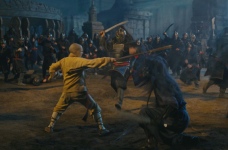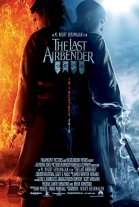The Last Airbender
|  The Last Airbender, M. Night Shyamalan’s live-action feature film version of the popular Nickelodeon anime-style series that ran for three years (2005 to 2008), is a vast and largely joyless--at times leaden--epic. Having never seen the television series, I can’t make any comparisons, but it is hard to imagine that it became so popular by being as devoid of humor and emotion as Shyamalan’s film is. Coming off back-to-back disappointments with his colossal misfire Lady in the Water (2006) and the underappreciated The Happening (2008), Shyamalan has fallen quite far from the day in 2002 when Newsweek declared him “The Next Spielberg,” which has had the unfortunate effect of hastening the desire of far too many to knock him off his pedestal. The Last Airbender, M. Night Shyamalan’s live-action feature film version of the popular Nickelodeon anime-style series that ran for three years (2005 to 2008), is a vast and largely joyless--at times leaden--epic. Having never seen the television series, I can’t make any comparisons, but it is hard to imagine that it became so popular by being as devoid of humor and emotion as Shyamalan’s film is. Coming off back-to-back disappointments with his colossal misfire Lady in the Water (2006) and the underappreciated The Happening (2008), Shyamalan has fallen quite far from the day in 2002 when Newsweek declared him “The Next Spielberg,” which has had the unfortunate effect of hastening the desire of far too many to knock him off his pedestal.Regardless, The Last Airbender does not strike a note of confidence in his resurrection, not so much because it is a bad film, but because it is so badly matched to Shyamalan’s talents. Although almost all of his films have been some variation on a fantasy genre (horror, science fiction, superhero, etc.), their best moments are the ones where we don’t see what we expect or anything at all. Shyamalan is a master of suggestion and misdirection and creating anticipation, and a big-budget techno-marvel like The Last Airbender demands the opposite: that everything be put up on the screen and nothing left to the imagination. Thus, Shyamalan discards his traditional aesthetic and adopts something much bigger, more obvious, and decidedly in-your-face. There is nothing subtle about this mammoth fantasy epic, and the best thing I can say about it is that at least Shyamalan doesn’t fall prey to the current fashion of hacking every action scene into a million incoherent flashes (see: The A-Team), but rather relies on a more elegant long-take approach that allows us to soak in the imagery (unless you happen to see the film in 3-D, which, from what I have heard, is a disastrous retro-fit that takes already dark imagery and makes it virtually impenetrable). The story takes place in a fantasy world that is divided among four tribes, each of which represents one of the fundamental elements: the Air Nomads, the Water Tribe, the Earth Kingdom, and the Fire Nation. Within each of these tribes are “benders,” people endowed with the gift of being able to control that element with their minds. Every generation there is born someone who has the power to control all four elements and can speak with otherwise invisible animal spirits: That person is called the “avatar” and is crucial to keeping the peace among the four tribes. Unfortunately, there hasn’t been an avatar for 100 years, and the tribes have fallen into warfare, mostly due to the industrially advanced Fire Tribe, which travels the world in massive iron ships dominating the other tribes. The first member of the Fire Tribe we meet is Prince Zuko (Dev Patel, the star of Slumdog Millionaire), who we eventually learn has been banished and exiled by his father, the Fire Lord (Cliff Curtis), and the only way he can get back into his good graces is by finding the avatar and bringing him in alive. The avatar, it turns out, is a child named Aang (Noah Ringer), who was raised in a monastery, but ran away for reasons that aren’t revealed until later in the film. He and his “sky bison,” a giant flying creature that looks like a cross between the Luck Dragon of The NeverEnding Story (1984) and one of Maurice Sendak’s Wild Things, became trapped under the ice of the northern territory and were freed by Katara (Nicola Peltz), a young woman of the Water Tribe who is also a nascent bender, and her older and very protective brother Sokka (Jackson Rathbone). It becomes clear that Aang is not only the last airbender of the title (all the other airbenders having been killed by the Fire Nation), but the avatar, which means that he is targeted by Prince Zuko and his rival in the Fire Tribe, Commander Zhao (Aasif Mandvi), both of whom want to capture him to curry the Fire Lord’s favor. Meanwhile, Katara and Sokka must ferry Aang all around the world to help foment a rebellion against the Fire Tribe while also training him in the ways of bending all the elements so that he can fulfill his destiny. If that sounds like a lot for a two-hour movie, it is, and the bum-rush of often wooden exposition that fills virtually every non-fighting moment of The Last Airbender is testament to how much Shyamalan tries to pack into it. The problem is that the narrative never rises above that exposition, so the characters never come into their own; they are all just ciphers being moved like chess pieces through the complex narrative machinations required to get us to a Lord of the Rings-style final battle in a massive city made of ice and an open ending that leaves plenty of room for sequels. The closest any of the characters come to breathing with real life is Dev Patel’s Prince Zuko, but that is because he is the only one with any sense of complexity; he is a villain, yet he is also tragic, and Patel imbues him with a deeply ingrained sense of bitterness and intensity that makes it impossible to determine whether he has the potential for redemption or whether he is permanently damaged. The rest of the characters are forgettable, leaving us with the film’s digital spectacle, which is frequently impressive, but also hollow in its lack of emotional resonance. Images of characters moving dirt and water and fire and wind with their minds makes for an interesting twist on routine summer-movie battles, and Shyamalan and cinematographer Andrew Lesnie (who shot Peter Jackson’s last five films, including all three Lord of the Rings films) give the actions a sense of weight and gravity with their slow motion tracking shots. Yet, because there is no sense of anything being at stake, the action never rises above its rapidly diminishing “wow” factor, which makes the film’s final stretches feel long and tiresome, rather than compelling. It was an interesting experiment to match Shyamalan with special-effects-heavy spectacle, but if The Last Airbender is any indication, he needs to return to territory that better suits his talents. Copyright ©2010 James Kendrick Thoughts? E-mail James Kendrick All images copyright © Paramount Pictures / Nickelodeon Movies |
Overall Rating: 
 (2)
(2)


